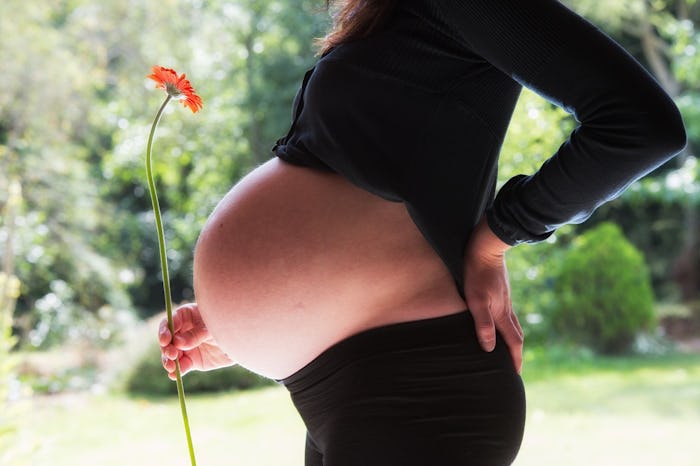Life

Why You Should Care About Maternal Mental Health Stigma, Even If You Haven’t Been Affected
May is Mental Health Awareness Month, which means news outlets, schools, and other individuals in positions of power are asked to speak about mental illnesses to bring to attention to mental illnesses and to help normalize them. But May is also Maternal Mental Health Month, which, like its counterpart, is designed to bring attention to mental health issues. However, its additional aim is help mothers and to bring awareness to various perinatal mood disorders, including prenatal depression, postpartum depression, postpartum anxiety, and postpartum psychosis. But, why should you care about the maternal mental health stigma, even if you aren't a mom? Even if you haven’t been affected?
Well, in short, everyone should care about maternal mental health — and mental health in general — because a stigma still exists and it still persists, and that stigma keeps many new moms silent and ashamed, which can become dangerous. Stigma keeps many new moms from getting the help they so desperately need, which can lead them to harm themselves or accidentally harm others.
Silence and shame — coupled with a mental illness — can kill.
And maternal mental illnesses are relatively common. In fact, one in seven new moms will get postpartum depression, according to Postpartum Progress — a nonprofit that works to “raise awareness, fight [the] stigma and provide peer support and programming to women with maternal mental illness[es].” This means that more than 15 percent of all moms will have (or have had) a perinatal mood disorder. However, that number is believed to be higher, and some sources estimate up to 20 percent of all new moms — or one in five — suffer from PPD (postpartum depression) — because the stigma keeps many silent. The stigma keeps many from reaching out and getting help and being properly diagnosed.
And that was true in my case. In fact, the stigma kept me silent for five full months.
I knew I was struggling with postpartum depression when my daughter was just six weeks old. I cried every day and tossed and turned every night. I was nervous and anxious. I was suicidal. But instead of talking to my husband or reaching out for help, I suffered in silence. I slapped on a smile and pretended everything was OK, because I was supposed to be grateful for my new child. I was supposed to be happy. These were supposed to be the “best days of my life.” But they weren’t, and I was ashamed. I felt cold and callous. I was empty and emotionless, and I was a “bad mom.”
The guilt kept me quiet — I was so embarrassed and so shamed — that the guilt nearly killed me, because I was certain I should kill myself to keep my daughter safe. I was certain I should kill myself to give her —and my husband — a chance to find the mother she deserved. And I was technically one of the “lucky ones," because I finally stood up and spoke out and got help. Not every woman finds that “strength.” And not every woman has support. That is why everyone should care about the stigma — so that moms everywhere know they are not alone and they won't be shamed for their emotions. Knowing this, hopefully, more of them will reach out to get help.
So for the sake of all women: For the sake of wives, mothers, sisters, aunts, cousin, female coworkers and friends, I implore people to understand the gravity of these diseases, to talk about these illnesses, and to learn the symptoms. Know how to the recognize when someone you love is suffering and needs an ear or your help. And, then, have a genuine conversation — an open, honest, and judgement-free conversation — because years of acceptance and discussion will only remove the stigma, which will certainly safe lives.